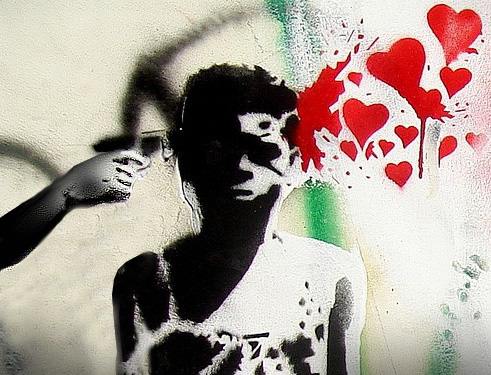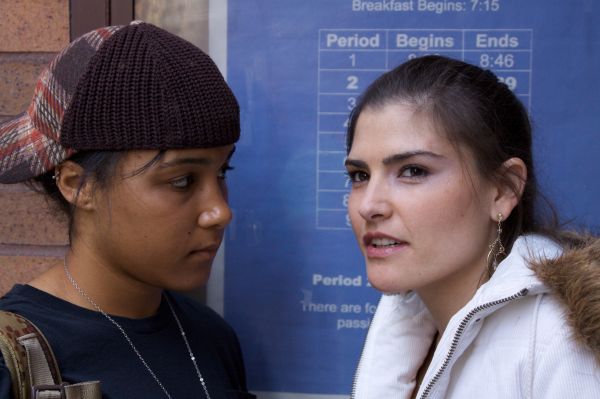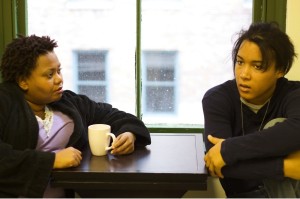
Image by Kelly Syring
I’m not as concerned with the persistent presence of fear and ridicule as I am with the conspicuous absence of understanding and respect, particularly in communities of color.
– Chisa Hutchinson
Most of us wake up in the morning wondering if we’re going to do anything that day … or any day … that will leave an impression on others. For most of us it’s enough to just touch a few lives in a positive way, to give something or share something or even to just illuminate something for those we’re close to in order to raise consciousness a little bit, or a little bit more. However, at the age of 16 in the rough streets of Newark Sakia Gunn was probably thinking very little about making an impression and just was focusing on how to get through her day. Being young, black and gay in a rough urban community doesn’t leave much room for being different. And in Sakia’s case, there was no room at all.

Kia (Karen Eilbacher) and Marisol (Karen Sours)
Chisa Hutchinson heard the story of how Sakia Gunn was killed at a Newark bus stop for being a lesbian, and it moved her to write She Like Girls, the story of Kia Clark (Karen Eilbacher), her first love, Marisol Feliciano (Karen Sours) and the violence brought upon both of them in a community that doesn’t understand or accept homosexuality. And in doing so, Ms. Hutchinson attempts to give Sakia Gunn’s last day a vibration that leave lasting impressions on all who see this play.
She Like Girls (directed by Jared Culverhouse) starts off in a dream and ends in a nightmare … what takes place between those two scenes is a story that’s been told since time began. The fact that this is a teen love story between two tentative girls only slightly skews the development; there is as much self absorption, awkwardness, second guessing, longing, fantasy and romance as any story of first love, except these two lovers are living in a place where one small difference can alienate you and beat you down, and defeat you in the end.
Kia’s world is a place of conflict. Her mother (Amelia Fowler) and best friend Andre (Paul Notice II) constantly try to fit her into a girly-girl role, completely ignoring the fact that Kia dresses, talks, moves, acts and (thanks to the door we’re given into her mind) even thinks like a guy. When Kia goes to school she’s bombarded by her teachers with gender stereotypes. During Sex Ed she’s given a less-than-complete lesson by her Gym Teacher (Ashley Noel Jones):“This… is a penis… I know it’s really a banana, but just—just bear with me, alright? [...] Unless you’re planning on becoming a nun or something, you are going to encounter at least one of these in your lifetime.” The fact that someone in this gym teacher’s class could even be “or something” doesn’t even warrant a pause. Meanwhile in English class Kia’s gay teacher Mr. Keys (Adam Belvo) reads poetry by a lesbian poet, Adrienne Rich, and uses the class as a vehicle to explain “She allowed herself to be locked away inside a life that she did not want because society had her convinced that the feelings she was having were “monstrous,” “wrong,” something she should be ashamed of and keep hidden… “ while in biology her science teacher (Chaz Rose) speaks of a “gay gene” and the “exciting” possibility of isolating the undesirable genes … “you could have the option of eliminating the possibility that your child would be overweight or a serial killer or a homosexual…” (or a nail-biter, to quote Anita Bryant) … “so if you knew in advance that he or she was going to suffer from diabetes or mental retardation, wouldn’t you want to take advantage of the opportunity to change that?” No wonder Kia is confused. Throw the impossibly appealing Marisol into the mix and it makes sense that Kia would be one hell of a confused adolescent. Still … weren’t we all? Sure. But we didn’t all get beaten, taunted and killed because of it.

Regina (Amelia Fowler) and Kia (Karen Eilbacher)
The real tragedy here is not the end of the play – though the fact that Kia got killed for defending who she was is most definitely tragic. But if we take a step back and say “how did it get to this?” we’d start seeing the real tragedies seeding themselves throughout Kia’s life in the lack of any real role models. Certainly her teacher, Mr. Keys, who points her in the direction of a GLBT support group, is a mentor of sorts. However he himself is a regular attendee of that support group … an almost stark realization that while this group may offer support, it may never leave members with the true tools they need to feel secure in the world. In addition, while Mr. Keys and Kia may both be on the same side of the line that divides, they are of completely different classes, generations, and social backgrounds. He is as much a peer to her as, say, Ellen DeGeneres might be. And in fact, in an angry speech he gives after finding “faggot” spray painted onto his car, he reveals a type of prejudice against these inner city kids that proves how much disdain he has for them despite his supposed message of tolerance: ” … in five years when, as an ironic twist, you’re pumping gas into my new faggoty little car, or I’m watching you on Jerry Springer or Cops, I still won’t hold a grudge. You know why? Because I may be a faggot, but I’m a successful one. I have a job that’s honest and honorable with health benefits and a retirement plan and if I want to leave said job because I’m tired of being harassed by a bunch of ignorant children, I have skills that are employable elsewhere. I have a loving, supportive family and a partner of seven years whom I will never have to demean into giving me child support on national television because I have been taught how to love instead of just how to fuck, although from what I hear, I’m pretty successful at that, too.” This may be the proud anthem of the gay man who celebrates his life, but from where I sat, it was a lot of hate speak to hear in one big vomitorious streak. Keys’ sexual orientation helps Kia’s situation about as much sharing the same skin color as her abusers helps her stay safe. Meaning: not at all.
Roll back a little more in search of a role model … take a look a Kia’s mother Regina. This woman could perhaps have them most in common with Kia … and all she can offer her daughter after it’s discovered that Marisol is gay is “If I found out you was… like that, I’d wanna beat yo’ ass, too…”. Comforting words, mom.
All of this makes Kia confused, angry, self-righteous. She is, after all, a teenager. So, when Kia’s story ends … and of course it must end in the saddest of ways, based as it is on the saddest of stories … there’s a moment when you want to shut her up, hold her tongue, tell her to not be so belligerent, to pick her battles, to choose her moments … but you know it’s already a pointless plea. She’s hard-wired with this false bravado, and nothing in her brief life, not even the awakening love for another girl, can put the breaks on this reckless drive.
I can’t help wondering if there had been better role models for Kia, and Sakia, if she would still be alive today. And it is here where I agree fully with Ms. Hutchinson – that fear and ridicule will always exist, but understanding and respect must grow in order to stem the tide.
~~~
She Like Girls


{ 1 comment… read it below or add one }
Great review, Karen. I hope I get a chance to see this next week. It’s such a tragedy, but hopefully some people will walk away from the piece with a better understanding that might make them think twice before spewing negativity and hatred.
Regardless, I’ve heard it was a moving and thoughtful play with lovely performances.